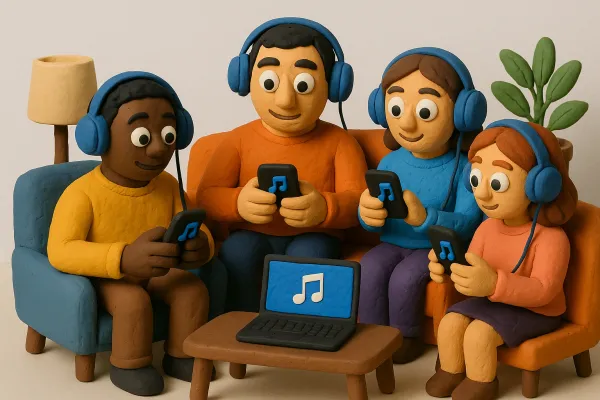Unlocking Your Sound: How a Genre Detector Can Transform Your Music Experience

Ever wondered how a genre detector could change the way you listen to music? These smart tools are like having a personal DJ that knows exactly what you want to hear. They sort through your music, organize it, and even help you discover new songs. It's not just about finding tunes you like; it's about transforming your whole music experience. From making playlists to exploring fresh tracks, genre detectors open up a world of sound tailored just for you.
Key Takeaways
- Genre detectors can organize and enhance your music library.
- They help in discovering new music based on your taste.
- Playlists become more personalized and enjoyable.
- Music creation is influenced by genre insights.
- Future tech will make genre detection even more precise.
Understanding the Role of a Genre Detector in Music
How Genre Detectors Work
Genre detectors are fascinating tools that use advanced algorithms to identify the musical style of a track. At their core, these detectors analyze audio features such as tempo, rhythm, and melody. They often rely on techniques like the Fourier transform to break down sound signals into frequencies and amplitudes. This helps in understanding the core elements of the music. A popular method involves using machine learning models like convolutional neural networks (CNNs), which are trained to recognize patterns in audio data. The process might start with converting audio files into spectrograms, which visually represent sound frequencies over time. The trained models then classify these features into genres, making it easier for users to categorize their music collection.
The Importance of Genre in Music
Genres play a crucial role in how we experience music. They serve as a framework for understanding and categorizing the vast array of musical styles and traditions. Knowing the genre of a track can influence how listeners perceive it and can guide them towards music that aligns with their tastes. Additionally, genres help musicians and producers to market their work effectively, targeting specific audiences who are more likely to appreciate their style. By understanding genres, listeners can better explore music that resonates with their personal preferences, leading to a richer and more fulfilling music experience.
Benefits of Using a Genre Detector
Utilizing a genre detector offers several advantages:
- Enhanced Music Organization: Easily sort and categorize your music library, making it simple to find tracks that fit a particular mood or occasion.
- Discover New Music: By recognizing genres, these tools can recommend tracks you might enjoy but haven't yet explored.
- Improved Playlist Creation: Curate playlists with a cohesive flow, ensuring all songs complement each other in style and mood.
With genre detectors, music lovers can transform their listening experience, making it more personalized and engaging. These tools not only simplify music management but also open up a world of new musical discoveries.
Enhancing Your Music Library with Genre Detection
Organizing Your Music Collection
Keeping your music organized can feel like an endless task, especially when your collection keeps growing. Genre detection tools make it a breeze to sort through heaps of tracks. They automatically tag each song with its genre, saving you from the tedious task of manual sorting. Imagine opening your music library and having everything neatly categorized—rock, jazz, electronic, and more—all at your fingertips. This kind of organization not only makes finding your favorite tunes easier but also keeps your library tidy and accessible.
Discovering New Music Through Genres
Genre detection isn't just about sorting what you already have; it's about expanding your musical horizons. By using these tools, you can explore new genres effortlessly. If you've been a die-hard pop fan, genre detection might introduce you to indie or folk music you never knew you'd love. It’s like having a personal music guide that suggests fresh tracks based on your preferences. With platforms like Djoid's AI-driven music curation, discovering new music becomes an exciting adventure rather than a chore.
Improving Playlist Curation
Creating the perfect playlist is an art form, and genre detection can be your secret weapon. Whether you’re crafting a playlist for a workout, a party, or a chill evening at home, knowing the genre of each track helps you build a seamless flow of music. These tools analyze your tracks and suggest the best fits for your playlist, ensuring every song hits the right note. Plus, if you're a DJ or just love hosting, having a well-curated playlist can make all the difference in setting the mood and keeping the energy just right. With genre detection, your playlists will be more than just a random mix—they’ll be a curated experience.
The Technology Behind Genre Detectors

Machine Learning in Genre Detection
Machine learning is the backbone of modern genre detectors. These systems rely on algorithms that sift through vast amounts of audio data to identify patterns and features associated with different musical genres. Unlike humans, machines don’t actually "hear" music; they analyze it. They break down audio signals into data points, which can be used to train models to recognize genres. This involves feeding the machine learning model with labeled datasets where each track is tagged with its corresponding genre. Over time, the model learns to associate specific audio features with particular genres, improving its accuracy.
Audio Features Analyzed by Genre Detectors
Genre detectors analyze a variety of audio features to classify music. Some of these features include:
- Tempo: The speed at which a piece of music is played, usually measured in beats per minute (BPM).
- Harmony: The combination of different musical notes played or sung simultaneously.
- Melody: The sequence of notes that make up the tune of the music.
Additionally, tools like the Fourier Transform are used to break down sound signals into their constituent frequencies, providing a detailed view of the audio's structure. This helps in pinpointing the unique characteristics that differentiate one genre from another.
Challenges in Genre Detection Technology
Despite advancements, genre detection still faces several challenges. One major issue is the robustness against audio manipulation. Music is often subject to various forms of manipulation, such as remixes or covers, which can alter its original features. Another challenge is generalizing models to recognize genres in previously unseen music. Since music is continuously evolving, genre detectors must adapt to new styles and trends to remain effective.
Genre detection technology is a fascinating blend of art and science, pushing the boundaries of how we interact with music. As these tools become more sophisticated, they offer the promise of a more personalized and enriched listening experience.
Transforming Music Creation with Genre Detection

Inspiring Creativity with Genre Insights
When you're diving into music creation, genre detection can be a game-changer. Imagine having a tool that helps you explore different musical styles and find inspiration from them. This isn't just about identifying genres; it's about using those insights to fuel your creativity. You can experiment with blending elements from various genres, which can lead to unique and innovative sounds. Genre detection can open up a world of possibilities, encouraging you to step out of your comfort zone and try something new.
- Mix and match styles to create fresh, original tracks.
- Gain a deeper understanding of musical structures and themes.
- Push the boundaries of traditional music genres.
Customizing Music Production
With genre detection, customizing your music production process becomes much easier. By understanding the specific characteristics of different genres, you can tailor your production techniques to suit the style you're working with. Whether you're looking to produce a jazz-infused pop song or a rock-inspired electronic track, genre detection tools provide valuable insights that can guide your production decisions.
- Adjust your mixing and mastering techniques based on genre-specific needs.
- Select instruments and sounds that align with your chosen style.
- Fine-tune your arrangements to highlight genre-specific elements.
Genre Detection in Music Composition Tools
Music composition tools that incorporate genre detection are transforming the way artists create music. These tools analyze your compositions and suggest genre-based improvements, helping you refine your work. They can also recommend AI music discovery tools that introduce you to complementary genres, expanding your musical palette. With these tools, you're not just composing; you're collaborating with technology to craft music that's both innovative and authentic.
Embracing genre detection in music creation can lead to a more personalized and fulfilling artistic journey. By leveraging these insights, you can create music that truly resonates with your audience and reflects your unique artistic vision.
Exploring the Impact of Genre Detectors on Music Consumption
Genre detectors have changed how we experience music. Instead of sticking to one genre, listeners now explore a wide range of music styles. Genre detectors help listeners discover music they might not have found otherwise. This exploration leads to a richer and more diverse listening experience.
Influence on Music Streaming Services
Music streaming services use genre detection to personalize user experiences. They analyze your listening habits and suggest new tracks that match your tastes. This technology helps create playlists that fit your mood, time of day, or activity, making music discovery more enjoyable.
User Experience and Personalization
Personalization is the key to a great user experience. With genre detection, services can tailor recommendations, ensuring you hear music that resonates with your preferences. This technology enhances your connection to the music, creating a more immersive and satisfying listening journey.
Genre detectors play a crucial role in maintaining artists' creative integrity and authenticity. They foster a genuine connection between artists and their fans by ensuring audiences can discern the true nature of music. AI music detectors ensure that this connection remains strong, providing a more authentic music experience.
Future Trends in Genre Detection Technology
Advancements in AI for Music
The world of music is on the brink of a transformation, thanks to the rapid advancements in AI technology. AI's ability to analyze and interpret complex audio signals is growing exponentially. This means that genre detectors are becoming more accurate and nuanced, capable of identifying sub-genres and even mood-based categories. As AI continues to evolve, we can expect genre detectors to become even more sophisticated, offering users a deeper understanding of their music preferences.
Potential New Applications
With the rise of AI, the potential applications for genre detection are expanding beyond traditional music categorization. Imagine a world where genre detectors can assist in creating personalized soundtracks for movies or video games, enhancing the overall experience. This technology could also be used in therapeutic settings, helping to curate playlists that aid in relaxation or concentration. The possibilities are endless, and as AI continues to advance, we are likely to see genre detection technology being integrated into a variety of new domains.
The Future of Music Personalization
The future of music personalization is bright, with genre detectors playing a key role. As these tools become more refined, they will enable streaming services to offer tailored recommendations that go beyond basic genre classifications. Users will be able to discover new music that aligns with their unique tastes, creating a more personalized listening experience. This level of personalization could revolutionize how we consume music, making it more enjoyable and fulfilling.
As we look to the future, it's clear that genre detection technology will continue to shape the music industry in exciting ways. From enhancing personalization to opening up new applications, the potential is vast and largely untapped. Embracing these advancements will undoubtedly lead to a richer, more diverse musical landscape.
For those interested in exploring these innovations further, it's worth exploring the latest innovations in machine learning technology and how they can enhance product offerings in 2025.
Conclusion
So, there you have it. A genre detector isn't just some fancy tool for music nerds. It's like having a personal DJ who knows exactly what you want to hear. Whether you're trying to discover new tunes or just want to understand your own music taste better, this tech can really shake things up. It's not about being a music expert; it's about enjoying music in a way that feels right for you. So why not give it a shot? You might just find your new favorite song or even a whole new genre you never knew you'd love. Music is all about exploration, and with a genre detector, the possibilities are endless. Happy listening!
Frequently Asked Questions
What is a genre detector?
A genre detector is a tool that helps identify the style or category of music, like rock, pop, or jazz, by analyzing the song's features.
How do genre detectors work?
Genre detectors use technology to examine different elements of a song, like rhythm and melody, to figure out its style.
Why is genre important in music?
Genres help us organize music, making it easier to find songs we like and discover new ones.
How can a genre detector improve my music library?
It can help sort your songs into categories, making it easier to create playlists and find music that matches your mood.
What role does machine learning play in genre detection?
Machine learning helps genre detectors get better at recognizing music styles by learning from lots of songs.
Can genre detectors help me create music?
Yes, they can inspire creativity by showing you different styles and helping you mix them into your own music.





